Evidence-Based Practice in Musculoskeletal Physiotherapy: A Report
VerifiedAdded on 2023/06/13
|7
|1944
|241
Report
AI Summary
This report discusses evidence-based practices in musculoskeletal physiotherapy, emphasizing the integration of research evidence, clinical expertise, and patient values to enhance patient outcomes. It identifies new knowledge in musculoskeletal physiotherapy, particularly concerning intervention procedures in cerebral palsy, and stresses the importance of transferring this knowledge to physicians and stakeholders. The report includes a critical appraisal of two articles: one focusing on the roles and tasks of extended scope physiotherapy in Dutch primary care and the other on physiotherapy managers' views of musculoskeletal physiotherapy service provision in Ireland. The analysis highlights the increasing demand for primary healthcare, the evolving roles of physiotherapists, and the challenges and opportunities in delivering effective musculoskeletal care. The conclusion underscores the aims of extended physiotherapy in reducing healthcare costs and improving healthcare effectiveness through multidisciplinary collaboration and efficient resource utilization. Desklib offers a wealth of similar resources for students and researchers.

7005SOH Evidence-based practice Module
Assessment Brief
Assessment Brief
Paraphrase This Document
Need a fresh take? Get an instant paraphrase of this document with our AI Paraphraser

Table of Contents
INTRODUCTION...............................................................................................................................3
MAIN BODY.......................................................................................................................................3
Identify new knowledge and relevance to specific area of practice...................................................3
Identification of new knowledge must be transferred to physicians and other stakeholders..............4
Critical appraisal of Articles..............................................................................................................4
CONCLUSION....................................................................................................................................5
REFERENCES....................................................................................................................................7
INTRODUCTION...............................................................................................................................3
MAIN BODY.......................................................................................................................................3
Identify new knowledge and relevance to specific area of practice...................................................3
Identification of new knowledge must be transferred to physicians and other stakeholders..............4
Critical appraisal of Articles..............................................................................................................4
CONCLUSION....................................................................................................................................5
REFERENCES....................................................................................................................................7
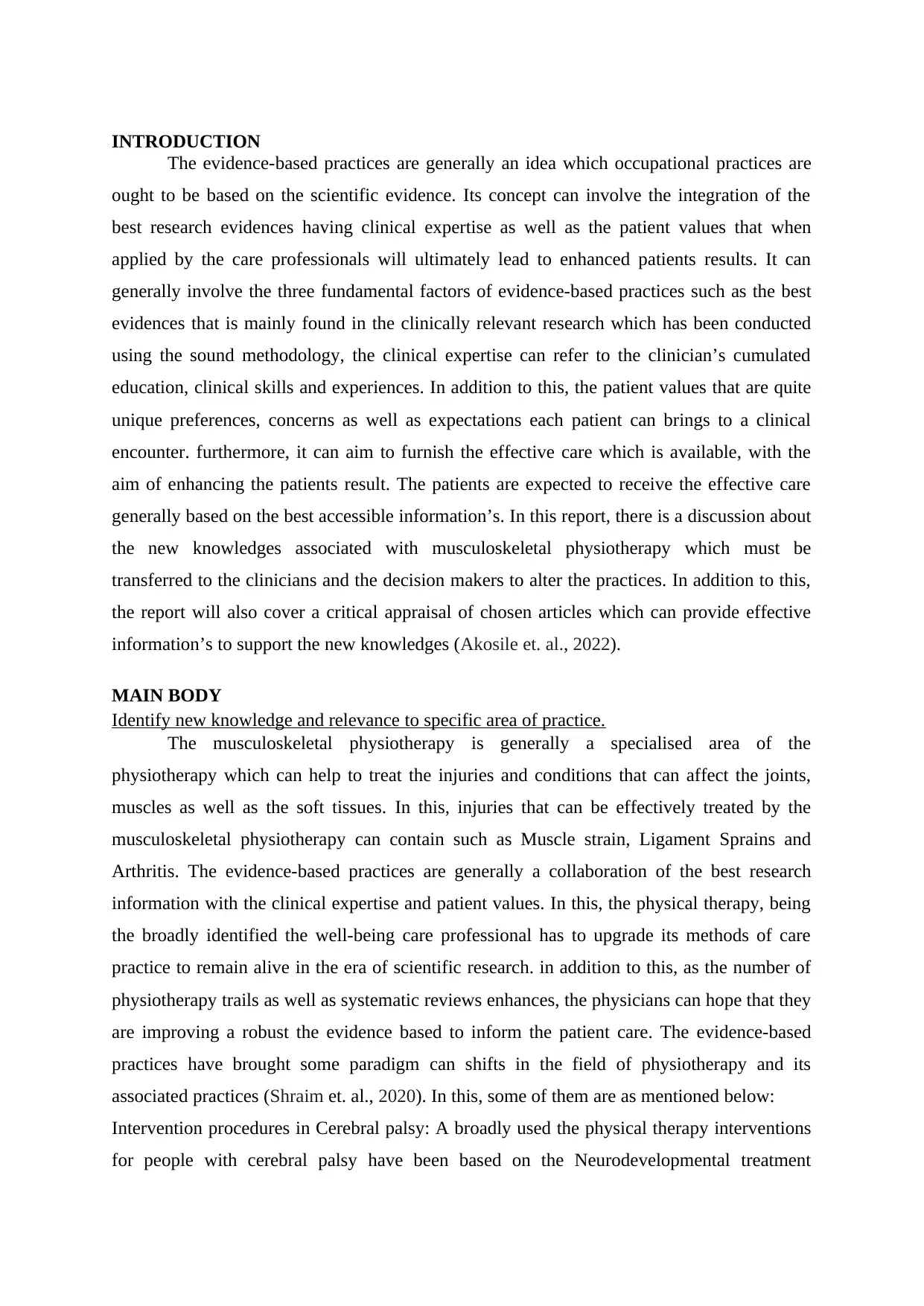
INTRODUCTION
The evidence-based practices are generally an idea which occupational practices are
ought to be based on the scientific evidence. Its concept can involve the integration of the
best research evidences having clinical expertise as well as the patient values that when
applied by the care professionals will ultimately lead to enhanced patients results. It can
generally involve the three fundamental factors of evidence-based practices such as the best
evidences that is mainly found in the clinically relevant research which has been conducted
using the sound methodology, the clinical expertise can refer to the clinician’s cumulated
education, clinical skills and experiences. In addition to this, the patient values that are quite
unique preferences, concerns as well as expectations each patient can brings to a clinical
encounter. furthermore, it can aim to furnish the effective care which is available, with the
aim of enhancing the patients result. The patients are expected to receive the effective care
generally based on the best accessible information’s. In this report, there is a discussion about
the new knowledges associated with musculoskeletal physiotherapy which must be
transferred to the clinicians and the decision makers to alter the practices. In addition to this,
the report will also cover a critical appraisal of chosen articles which can provide effective
information’s to support the new knowledges (Akosile et. al., 2022).
MAIN BODY
Identify new knowledge and relevance to specific area of practice.
The musculoskeletal physiotherapy is generally a specialised area of the
physiotherapy which can help to treat the injuries and conditions that can affect the joints,
muscles as well as the soft tissues. In this, injuries that can be effectively treated by the
musculoskeletal physiotherapy can contain such as Muscle strain, Ligament Sprains and
Arthritis. The evidence-based practices are generally a collaboration of the best research
information with the clinical expertise and patient values. In this, the physical therapy, being
the broadly identified the well-being care professional has to upgrade its methods of care
practice to remain alive in the era of scientific research. in addition to this, as the number of
physiotherapy trails as well as systematic reviews enhances, the physicians can hope that they
are improving a robust the evidence based to inform the patient care. The evidence-based
practices have brought some paradigm can shifts in the field of physiotherapy and its
associated practices (Shraim et. al., 2020). In this, some of them are as mentioned below:
Intervention procedures in Cerebral palsy: A broadly used the physical therapy interventions
for people with cerebral palsy have been based on the Neurodevelopmental treatment
The evidence-based practices are generally an idea which occupational practices are
ought to be based on the scientific evidence. Its concept can involve the integration of the
best research evidences having clinical expertise as well as the patient values that when
applied by the care professionals will ultimately lead to enhanced patients results. It can
generally involve the three fundamental factors of evidence-based practices such as the best
evidences that is mainly found in the clinically relevant research which has been conducted
using the sound methodology, the clinical expertise can refer to the clinician’s cumulated
education, clinical skills and experiences. In addition to this, the patient values that are quite
unique preferences, concerns as well as expectations each patient can brings to a clinical
encounter. furthermore, it can aim to furnish the effective care which is available, with the
aim of enhancing the patients result. The patients are expected to receive the effective care
generally based on the best accessible information’s. In this report, there is a discussion about
the new knowledges associated with musculoskeletal physiotherapy which must be
transferred to the clinicians and the decision makers to alter the practices. In addition to this,
the report will also cover a critical appraisal of chosen articles which can provide effective
information’s to support the new knowledges (Akosile et. al., 2022).
MAIN BODY
Identify new knowledge and relevance to specific area of practice.
The musculoskeletal physiotherapy is generally a specialised area of the
physiotherapy which can help to treat the injuries and conditions that can affect the joints,
muscles as well as the soft tissues. In this, injuries that can be effectively treated by the
musculoskeletal physiotherapy can contain such as Muscle strain, Ligament Sprains and
Arthritis. The evidence-based practices are generally a collaboration of the best research
information with the clinical expertise and patient values. In this, the physical therapy, being
the broadly identified the well-being care professional has to upgrade its methods of care
practice to remain alive in the era of scientific research. in addition to this, as the number of
physiotherapy trails as well as systematic reviews enhances, the physicians can hope that they
are improving a robust the evidence based to inform the patient care. The evidence-based
practices have brought some paradigm can shifts in the field of physiotherapy and its
associated practices (Shraim et. al., 2020). In this, some of them are as mentioned below:
Intervention procedures in Cerebral palsy: A broadly used the physical therapy interventions
for people with cerebral palsy have been based on the Neurodevelopmental treatment
⊘ This is a preview!⊘
Do you want full access?
Subscribe today to unlock all pages.

Trusted by 1+ million students worldwide
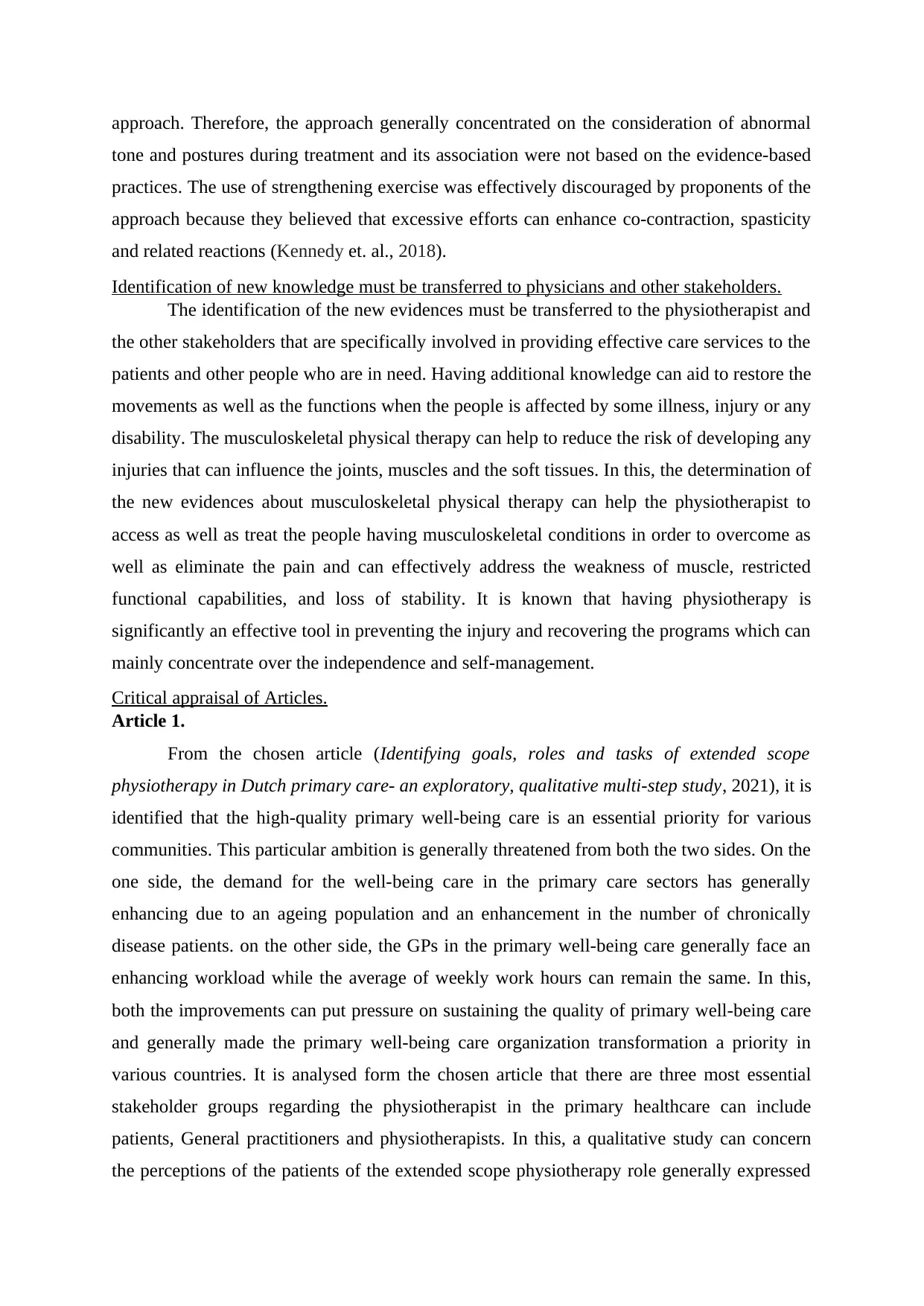
approach. Therefore, the approach generally concentrated on the consideration of abnormal
tone and postures during treatment and its association were not based on the evidence-based
practices. The use of strengthening exercise was effectively discouraged by proponents of the
approach because they believed that excessive efforts can enhance co-contraction, spasticity
and related reactions (Kennedy et. al., 2018).
Identification of new knowledge must be transferred to physicians and other stakeholders.
The identification of the new evidences must be transferred to the physiotherapist and
the other stakeholders that are specifically involved in providing effective care services to the
patients and other people who are in need. Having additional knowledge can aid to restore the
movements as well as the functions when the people is affected by some illness, injury or any
disability. The musculoskeletal physical therapy can help to reduce the risk of developing any
injuries that can influence the joints, muscles and the soft tissues. In this, the determination of
the new evidences about musculoskeletal physical therapy can help the physiotherapist to
access as well as treat the people having musculoskeletal conditions in order to overcome as
well as eliminate the pain and can effectively address the weakness of muscle, restricted
functional capabilities, and loss of stability. It is known that having physiotherapy is
significantly an effective tool in preventing the injury and recovering the programs which can
mainly concentrate over the independence and self-management.
Critical appraisal of Articles.
Article 1.
From the chosen article (Identifying goals, roles and tasks of extended scope
physiotherapy in Dutch primary care- an exploratory, qualitative multi-step study, 2021), it is
identified that the high-quality primary well-being care is an essential priority for various
communities. This particular ambition is generally threatened from both the two sides. On the
one side, the demand for the well-being care in the primary care sectors has generally
enhancing due to an ageing population and an enhancement in the number of chronically
disease patients. on the other side, the GPs in the primary well-being care generally face an
enhancing workload while the average of weekly work hours can remain the same. In this,
both the improvements can put pressure on sustaining the quality of primary well-being care
and generally made the primary well-being care organization transformation a priority in
various countries. It is analysed form the chosen article that there are three most essential
stakeholder groups regarding the physiotherapist in the primary healthcare can include
patients, General practitioners and physiotherapists. In this, a qualitative study can concern
the perceptions of the patients of the extended scope physiotherapy role generally expressed
tone and postures during treatment and its association were not based on the evidence-based
practices. The use of strengthening exercise was effectively discouraged by proponents of the
approach because they believed that excessive efforts can enhance co-contraction, spasticity
and related reactions (Kennedy et. al., 2018).
Identification of new knowledge must be transferred to physicians and other stakeholders.
The identification of the new evidences must be transferred to the physiotherapist and
the other stakeholders that are specifically involved in providing effective care services to the
patients and other people who are in need. Having additional knowledge can aid to restore the
movements as well as the functions when the people is affected by some illness, injury or any
disability. The musculoskeletal physical therapy can help to reduce the risk of developing any
injuries that can influence the joints, muscles and the soft tissues. In this, the determination of
the new evidences about musculoskeletal physical therapy can help the physiotherapist to
access as well as treat the people having musculoskeletal conditions in order to overcome as
well as eliminate the pain and can effectively address the weakness of muscle, restricted
functional capabilities, and loss of stability. It is known that having physiotherapy is
significantly an effective tool in preventing the injury and recovering the programs which can
mainly concentrate over the independence and self-management.
Critical appraisal of Articles.
Article 1.
From the chosen article (Identifying goals, roles and tasks of extended scope
physiotherapy in Dutch primary care- an exploratory, qualitative multi-step study, 2021), it is
identified that the high-quality primary well-being care is an essential priority for various
communities. This particular ambition is generally threatened from both the two sides. On the
one side, the demand for the well-being care in the primary care sectors has generally
enhancing due to an ageing population and an enhancement in the number of chronically
disease patients. on the other side, the GPs in the primary well-being care generally face an
enhancing workload while the average of weekly work hours can remain the same. In this,
both the improvements can put pressure on sustaining the quality of primary well-being care
and generally made the primary well-being care organization transformation a priority in
various countries. It is analysed form the chosen article that there are three most essential
stakeholder groups regarding the physiotherapist in the primary healthcare can include
patients, General practitioners and physiotherapists. In this, a qualitative study can concern
the perceptions of the patients of the extended scope physiotherapy role generally expressed
Paraphrase This Document
Need a fresh take? Get an instant paraphrase of this document with our AI Paraphraser
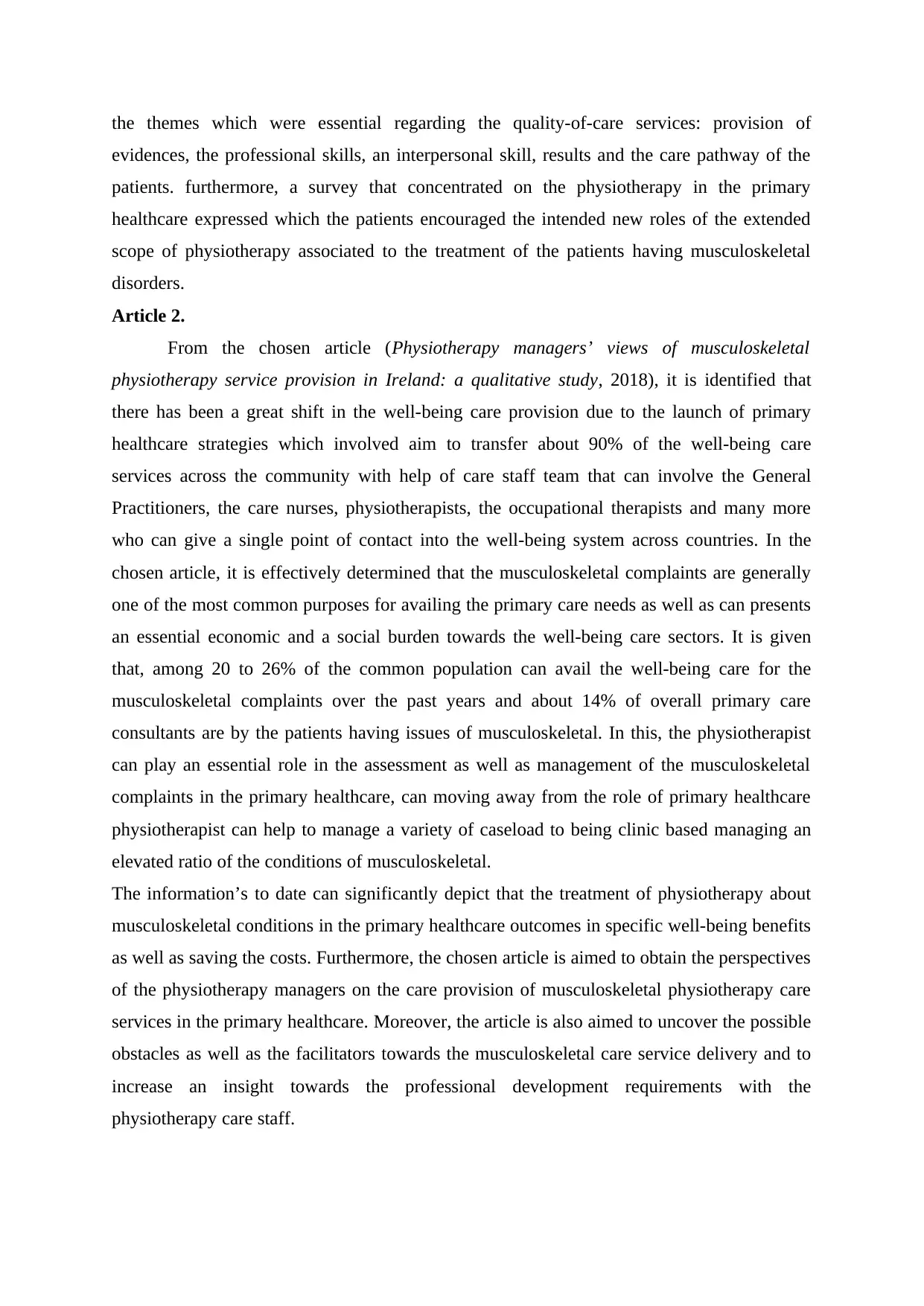
the themes which were essential regarding the quality-of-care services: provision of
evidences, the professional skills, an interpersonal skill, results and the care pathway of the
patients. furthermore, a survey that concentrated on the physiotherapy in the primary
healthcare expressed which the patients encouraged the intended new roles of the extended
scope of physiotherapy associated to the treatment of the patients having musculoskeletal
disorders.
Article 2.
From the chosen article (Physiotherapy managers’ views of musculoskeletal
physiotherapy service provision in Ireland: a qualitative study, 2018), it is identified that
there has been a great shift in the well-being care provision due to the launch of primary
healthcare strategies which involved aim to transfer about 90% of the well-being care
services across the community with help of care staff team that can involve the General
Practitioners, the care nurses, physiotherapists, the occupational therapists and many more
who can give a single point of contact into the well-being system across countries. In the
chosen article, it is effectively determined that the musculoskeletal complaints are generally
one of the most common purposes for availing the primary care needs as well as can presents
an essential economic and a social burden towards the well-being care sectors. It is given
that, among 20 to 26% of the common population can avail the well-being care for the
musculoskeletal complaints over the past years and about 14% of overall primary care
consultants are by the patients having issues of musculoskeletal. In this, the physiotherapist
can play an essential role in the assessment as well as management of the musculoskeletal
complaints in the primary healthcare, can moving away from the role of primary healthcare
physiotherapist can help to manage a variety of caseload to being clinic based managing an
elevated ratio of the conditions of musculoskeletal.
The information’s to date can significantly depict that the treatment of physiotherapy about
musculoskeletal conditions in the primary healthcare outcomes in specific well-being benefits
as well as saving the costs. Furthermore, the chosen article is aimed to obtain the perspectives
of the physiotherapy managers on the care provision of musculoskeletal physiotherapy care
services in the primary healthcare. Moreover, the article is also aimed to uncover the possible
obstacles as well as the facilitators towards the musculoskeletal care service delivery and to
increase an insight towards the professional development requirements with the
physiotherapy care staff.
evidences, the professional skills, an interpersonal skill, results and the care pathway of the
patients. furthermore, a survey that concentrated on the physiotherapy in the primary
healthcare expressed which the patients encouraged the intended new roles of the extended
scope of physiotherapy associated to the treatment of the patients having musculoskeletal
disorders.
Article 2.
From the chosen article (Physiotherapy managers’ views of musculoskeletal
physiotherapy service provision in Ireland: a qualitative study, 2018), it is identified that
there has been a great shift in the well-being care provision due to the launch of primary
healthcare strategies which involved aim to transfer about 90% of the well-being care
services across the community with help of care staff team that can involve the General
Practitioners, the care nurses, physiotherapists, the occupational therapists and many more
who can give a single point of contact into the well-being system across countries. In the
chosen article, it is effectively determined that the musculoskeletal complaints are generally
one of the most common purposes for availing the primary care needs as well as can presents
an essential economic and a social burden towards the well-being care sectors. It is given
that, among 20 to 26% of the common population can avail the well-being care for the
musculoskeletal complaints over the past years and about 14% of overall primary care
consultants are by the patients having issues of musculoskeletal. In this, the physiotherapist
can play an essential role in the assessment as well as management of the musculoskeletal
complaints in the primary healthcare, can moving away from the role of primary healthcare
physiotherapist can help to manage a variety of caseload to being clinic based managing an
elevated ratio of the conditions of musculoskeletal.
The information’s to date can significantly depict that the treatment of physiotherapy about
musculoskeletal conditions in the primary healthcare outcomes in specific well-being benefits
as well as saving the costs. Furthermore, the chosen article is aimed to obtain the perspectives
of the physiotherapy managers on the care provision of musculoskeletal physiotherapy care
services in the primary healthcare. Moreover, the article is also aimed to uncover the possible
obstacles as well as the facilitators towards the musculoskeletal care service delivery and to
increase an insight towards the professional development requirements with the
physiotherapy care staff.
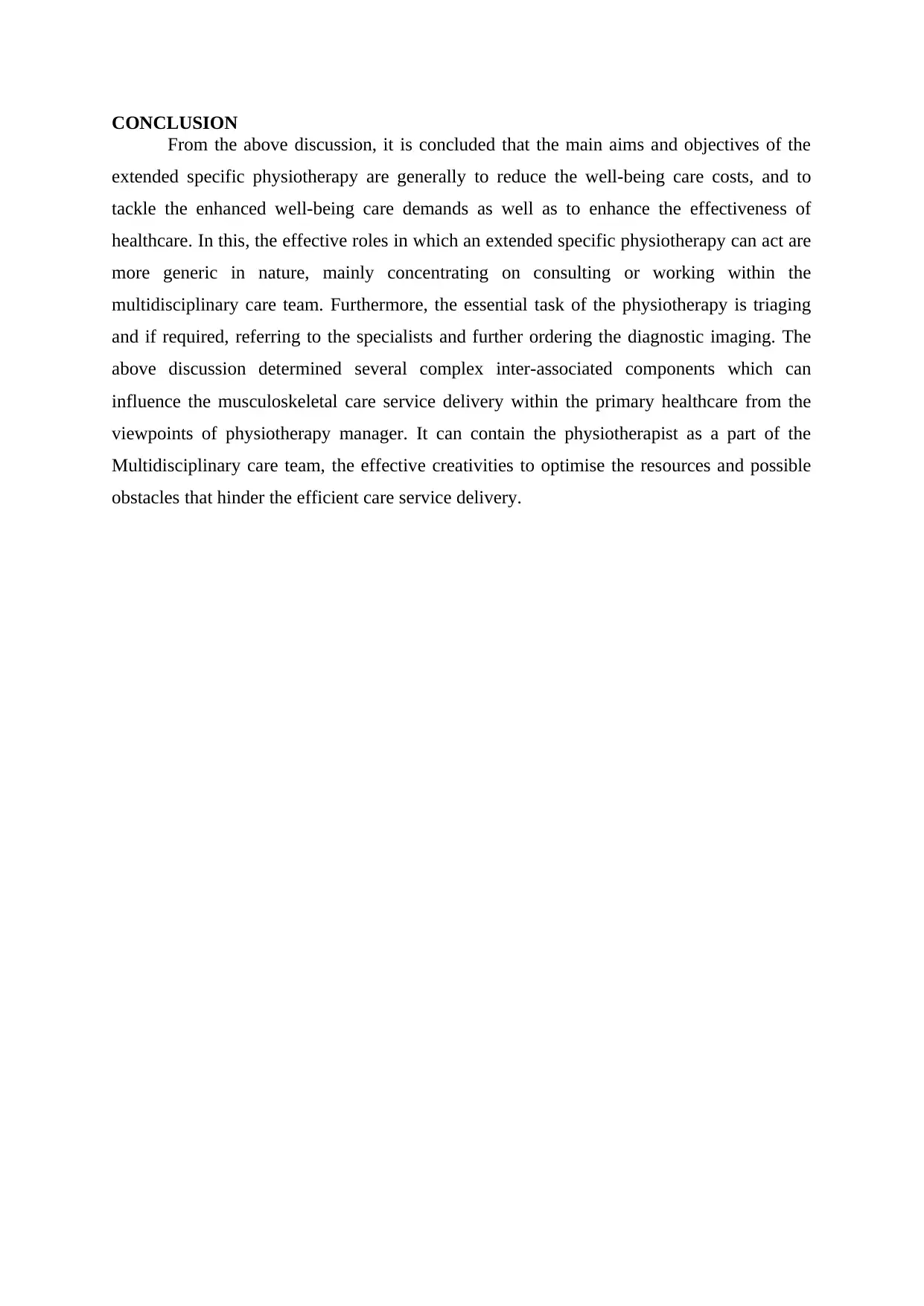
CONCLUSION
From the above discussion, it is concluded that the main aims and objectives of the
extended specific physiotherapy are generally to reduce the well-being care costs, and to
tackle the enhanced well-being care demands as well as to enhance the effectiveness of
healthcare. In this, the effective roles in which an extended specific physiotherapy can act are
more generic in nature, mainly concentrating on consulting or working within the
multidisciplinary care team. Furthermore, the essential task of the physiotherapy is triaging
and if required, referring to the specialists and further ordering the diagnostic imaging. The
above discussion determined several complex inter-associated components which can
influence the musculoskeletal care service delivery within the primary healthcare from the
viewpoints of physiotherapy manager. It can contain the physiotherapist as a part of the
Multidisciplinary care team, the effective creativities to optimise the resources and possible
obstacles that hinder the efficient care service delivery.
From the above discussion, it is concluded that the main aims and objectives of the
extended specific physiotherapy are generally to reduce the well-being care costs, and to
tackle the enhanced well-being care demands as well as to enhance the effectiveness of
healthcare. In this, the effective roles in which an extended specific physiotherapy can act are
more generic in nature, mainly concentrating on consulting or working within the
multidisciplinary care team. Furthermore, the essential task of the physiotherapy is triaging
and if required, referring to the specialists and further ordering the diagnostic imaging. The
above discussion determined several complex inter-associated components which can
influence the musculoskeletal care service delivery within the primary healthcare from the
viewpoints of physiotherapy manager. It can contain the physiotherapist as a part of the
Multidisciplinary care team, the effective creativities to optimise the resources and possible
obstacles that hinder the efficient care service delivery.
⊘ This is a preview!⊘
Do you want full access?
Subscribe today to unlock all pages.

Trusted by 1+ million students worldwide
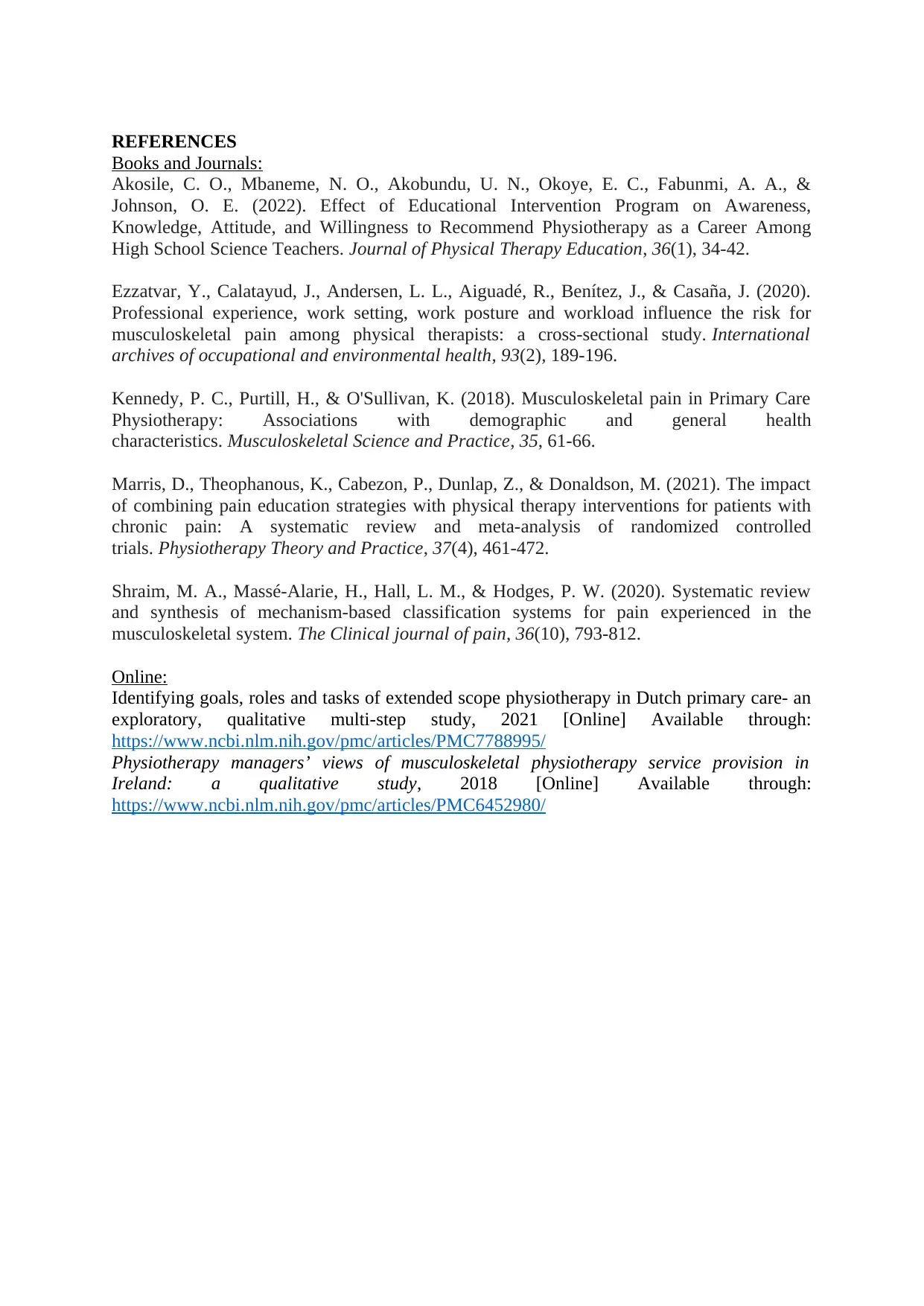
REFERENCES
Books and Journals:
Akosile, C. O., Mbaneme, N. O., Akobundu, U. N., Okoye, E. C., Fabunmi, A. A., &
Johnson, O. E. (2022). Effect of Educational Intervention Program on Awareness,
Knowledge, Attitude, and Willingness to Recommend Physiotherapy as a Career Among
High School Science Teachers. Journal of Physical Therapy Education, 36(1), 34-42.
Ezzatvar, Y., Calatayud, J., Andersen, L. L., Aiguadé, R., Benítez, J., & Casaña, J. (2020).
Professional experience, work setting, work posture and workload influence the risk for
musculoskeletal pain among physical therapists: a cross-sectional study. International
archives of occupational and environmental health, 93(2), 189-196.
Kennedy, P. C., Purtill, H., & O'Sullivan, K. (2018). Musculoskeletal pain in Primary Care
Physiotherapy: Associations with demographic and general health
characteristics. Musculoskeletal Science and Practice, 35, 61-66.
Marris, D., Theophanous, K., Cabezon, P., Dunlap, Z., & Donaldson, M. (2021). The impact
of combining pain education strategies with physical therapy interventions for patients with
chronic pain: A systematic review and meta-analysis of randomized controlled
trials. Physiotherapy Theory and Practice, 37(4), 461-472.
Shraim, M. A., Massé-Alarie, H., Hall, L. M., & Hodges, P. W. (2020). Systematic review
and synthesis of mechanism-based classification systems for pain experienced in the
musculoskeletal system. The Clinical journal of pain, 36(10), 793-812.
Online:
Identifying goals, roles and tasks of extended scope physiotherapy in Dutch primary care- an
exploratory, qualitative multi-step study, 2021 [Online] Available through:
https://www.ncbi.nlm.nih.gov/pmc/articles/PMC7788995/
Physiotherapy managers’ views of musculoskeletal physiotherapy service provision in
Ireland: a qualitative study, 2018 [Online] Available through:
https://www.ncbi.nlm.nih.gov/pmc/articles/PMC6452980/
Books and Journals:
Akosile, C. O., Mbaneme, N. O., Akobundu, U. N., Okoye, E. C., Fabunmi, A. A., &
Johnson, O. E. (2022). Effect of Educational Intervention Program on Awareness,
Knowledge, Attitude, and Willingness to Recommend Physiotherapy as a Career Among
High School Science Teachers. Journal of Physical Therapy Education, 36(1), 34-42.
Ezzatvar, Y., Calatayud, J., Andersen, L. L., Aiguadé, R., Benítez, J., & Casaña, J. (2020).
Professional experience, work setting, work posture and workload influence the risk for
musculoskeletal pain among physical therapists: a cross-sectional study. International
archives of occupational and environmental health, 93(2), 189-196.
Kennedy, P. C., Purtill, H., & O'Sullivan, K. (2018). Musculoskeletal pain in Primary Care
Physiotherapy: Associations with demographic and general health
characteristics. Musculoskeletal Science and Practice, 35, 61-66.
Marris, D., Theophanous, K., Cabezon, P., Dunlap, Z., & Donaldson, M. (2021). The impact
of combining pain education strategies with physical therapy interventions for patients with
chronic pain: A systematic review and meta-analysis of randomized controlled
trials. Physiotherapy Theory and Practice, 37(4), 461-472.
Shraim, M. A., Massé-Alarie, H., Hall, L. M., & Hodges, P. W. (2020). Systematic review
and synthesis of mechanism-based classification systems for pain experienced in the
musculoskeletal system. The Clinical journal of pain, 36(10), 793-812.
Online:
Identifying goals, roles and tasks of extended scope physiotherapy in Dutch primary care- an
exploratory, qualitative multi-step study, 2021 [Online] Available through:
https://www.ncbi.nlm.nih.gov/pmc/articles/PMC7788995/
Physiotherapy managers’ views of musculoskeletal physiotherapy service provision in
Ireland: a qualitative study, 2018 [Online] Available through:
https://www.ncbi.nlm.nih.gov/pmc/articles/PMC6452980/
1 out of 7
Related Documents
Your All-in-One AI-Powered Toolkit for Academic Success.
+13062052269
info@desklib.com
Available 24*7 on WhatsApp / Email
![[object Object]](/_next/static/media/star-bottom.7253800d.svg)
Unlock your academic potential
Copyright © 2020–2026 A2Z Services. All Rights Reserved. Developed and managed by ZUCOL.





